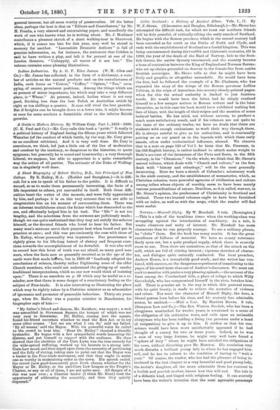Celtic Scotland : a History of Ancient 11/ban. Vols. I.,
II. By W. F. Skene. (Edtnonston and Douglas, Edinburgh.)—Mr. Skene has attempted the difficult task, for which we trust our northern friends will be duly grateful, of critically sifting the early annals of Scotland. He begins with the Roman province, which in the second century had been extended as far north as the Firths of Forth and Clyde, and ends with the establishment of Scotland as a feudal kingdom. This was being consummated during the twelfth and thirteenth centuries, till in 1290, the year of the death of the Maid of Norway, heir to the Scot- tish throne, the native dynasty terminated, and the country became a bone of contention between the King of England and Norman Barons, who set up claims grounded on descent in the female line from native Scottish sovereigns. Mr. Skeno tells us that he might have been lively and graphic, or altogether unreadable. He would have been the first, had be followed the example of a Mr. Chalmers, who has expanded the story of the doings of the Roman governor Lajas Urbicus, in the reign of Antoninus, into seventy closely-printed pages, when for this the actual authority is limited to just fourteen words. He would have been the latter, had he simply confined himself to a few meagre notices in Roman writers and in the later chronicles, as in this case his book would have exhibited nothing but lists of kings, with the length of their reigns and the mention of some isolated battles. He has tried, not without success, to produce a much more satisfactory result, and if his volumes are not quite to the taste of the ordinary reader, we have no doubt that there are students with enough enthusiasm to work their way through them. He is always careful to give us his authorities, and is continually putting us on our guard as to the legends with which these early annals, often under ecclesiastical influence, abound. We observe that in a note on page 150 of Vol I. he hints that Mr. Freeman, in his Old-English history, is rather inolined to attach undue weight to Bede's account of the incursions of the Picts and Scots, in the fifth century, in his " Chronicon." On the whole, we think that Mr. Skene's second volume, which deals with " Church and culture," as the first dealt with " history and ethnology," will be the most generally interesting. Here we have a sketch of Columba's missionary work in the sixth century, and the establishment of monasteries, which, as Christian colonies, were powerful agencies of civilisation and culture among tribes whose objects of worship seem to have• been merely various personifications of nature. Druidism, as it is oalled, was not, in Mr. Skene's opinion, the predecessor of Christianity in Scotland and Ireland. These two learned volumes ought to have been furnished with an index, as well as with the maps, which the reader will find most useful.


































 Previous page
Previous page